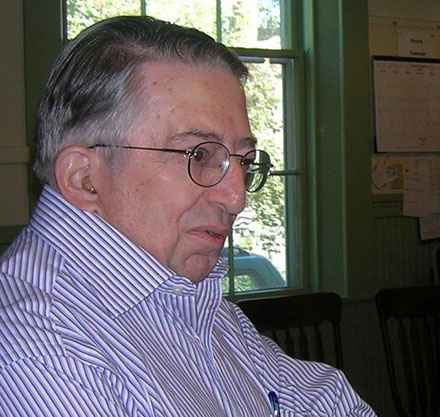Norman W. Ingham, Scholar of Medieval Slavic Literature, 1934-2015

The following appeared in UChicago News on 1 June 2015
Prof. Emeritus Norman W. Ingham, a meticulous and erudite scholar of medieval Slavic literature, died April 27 in Wilbraham, Mass. He was 80.
Ingham’s expertise spanned languages and time periods: He spoke Polish, Russian, Czech, Spanish, English, French, Italian, Old Church Slavonic and Greek, and studied 18-century Russian literature as well as early Slavic literature and folklore. He also wrote extensively on the works of Gogl, Turgenev and Tolstoy.
“He was broadly and deeply educated,” remembered his friend and colleague Valentina Pichugin, senior lecturer in Slavic Languages and Literatures.
Born in Granby, Mass. on Dec. 31, 1934, Ingham never lost his love of New England. Throughout his life, he looked forward to summers at his house in Massachusetts.
“I’m going home,” he would tell friends and colleagues in Chicago at the end of each school year.
Ingham received his BA from Middlebury College in 1957. He went on to study at the University of Michigan, where he received an MA in 1959, and Harvard, where he earned a PhD in 1963. During his graduate training, Ingham studied abroad at Leningrad State University, the Czechoslovak Academy of Sciences and the Charles University in Prague.
After stints at Harvard and Indiana University, Ingham joined the University of Chicago faculty in 1971. During his time at UChicago, he edited monographs including The Church and Religious Culture in Old Rus’ and authored E.T.A. Hoffman’s Reception in Russia, as well as numerous journal articles. Ingham retired in 2006.
He made a lasting impact on his field as the organizer for nearly two decades of the Midwest Medieval Slavic Workshop, which continues today. Ingham insisted on cordial but rigorous discussion, resulting in debates between participants that Pichugin described as “pure intellectual bliss.”
In his own appearances at the workshop, Ingham was known to recite long sections of Slavic literature from memory—and end his presentations exactly on time without ever glancing at the clock.
As a teacher, Ingham balanced his high expectations with warmth and humanity, even taking time to work with struggling students outside of class until they mastered the material.
His former student Sonia Ketchian remembered Ingham was “magnificently organized as he presented lectures with clarity, precision and relevant humor, while remaining ever attentive to student reaction and participation. Norman truly and actively encouraged independent thinking from his students. Writing a paper for him was a joy because the student could be certain of careful attention, objective evaluation and constructive corrections,” she wrote in an email.
Dryly witty and impeccably polite, Ingham was “an ideal colleague,” according to Pichugin. He made special efforts to welcome new colleagues, inviting them to his regular table in the Quadrangle Club for lunch.
In his spare time, Ingham developed a passion for genealogy and wrote a book on his family’s history. He also enjoyed watching sports and old movies, collecting stamps and Harry Potter memorabilia, and listening to opera.
Ingham is survived by two nieces, Patricia Gelinas and Judith Ingham; and five nephews, Lewis, Bill, Earl, Richard and Larry Ingham. Services have been held.